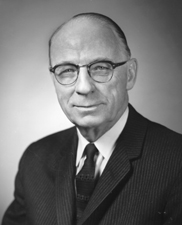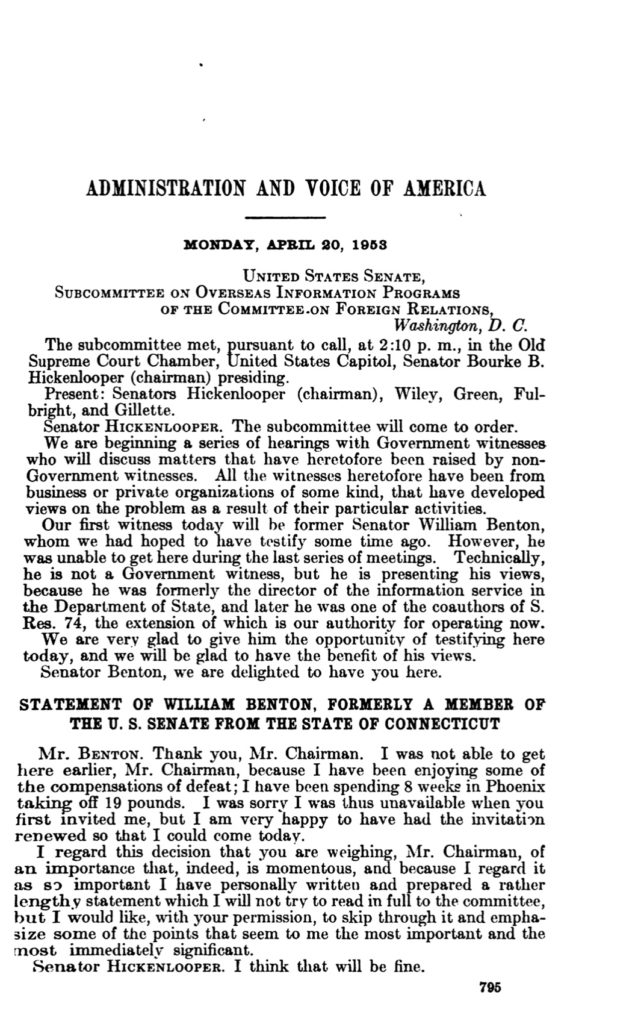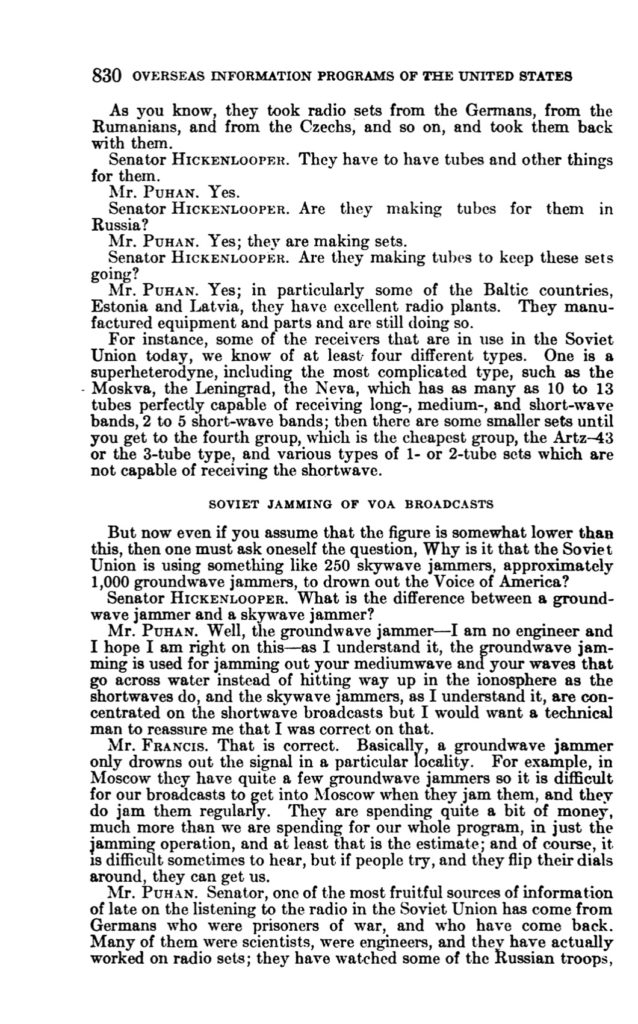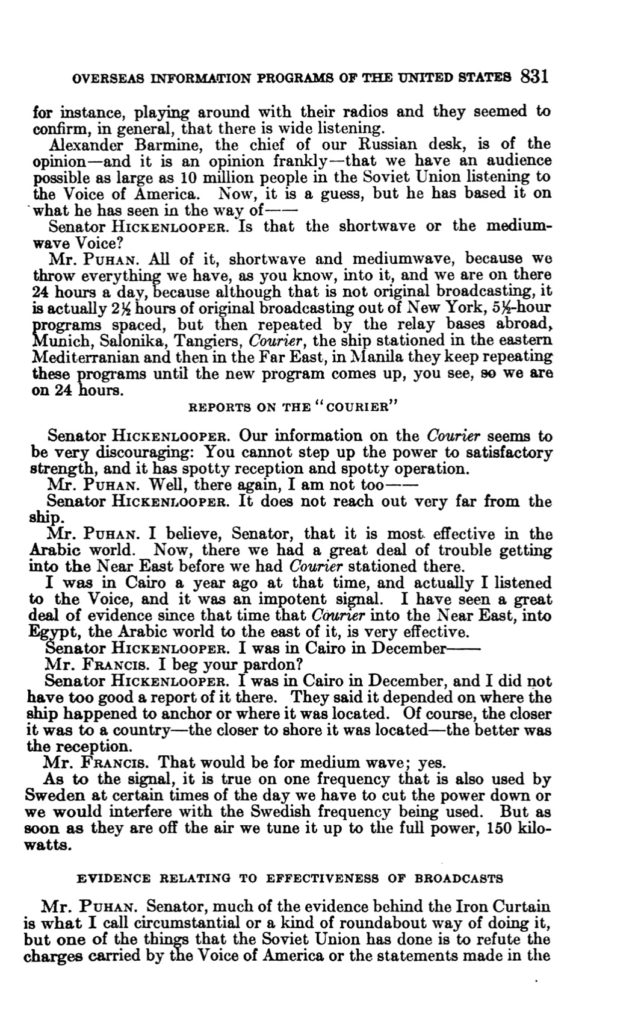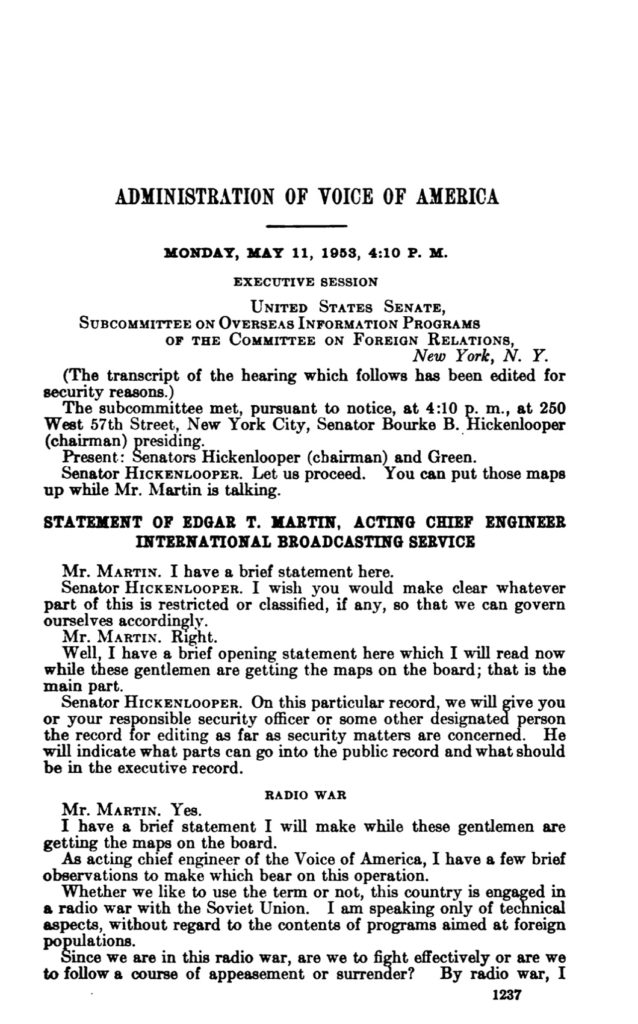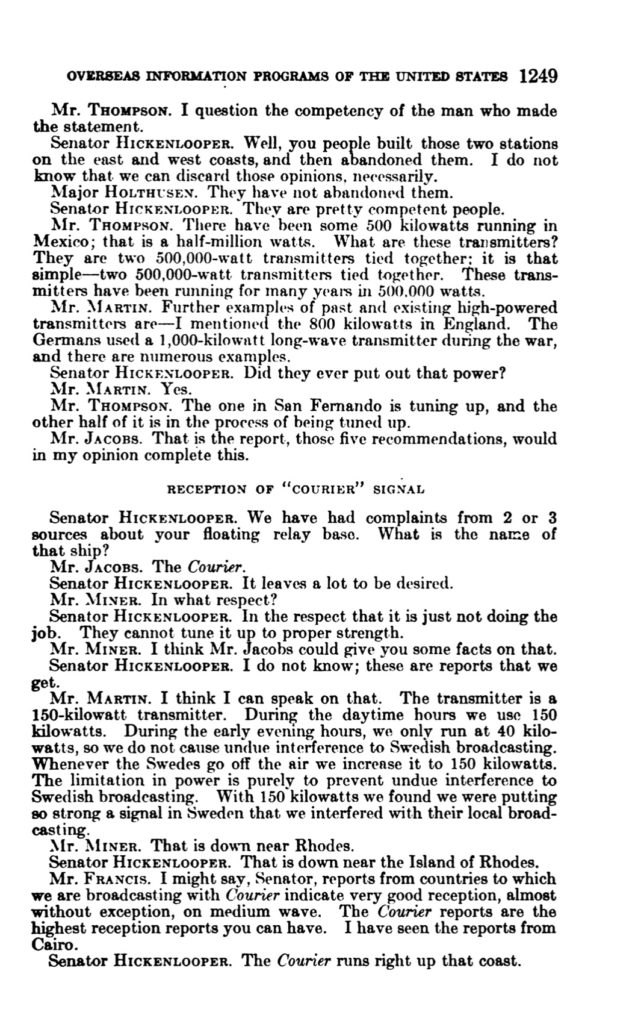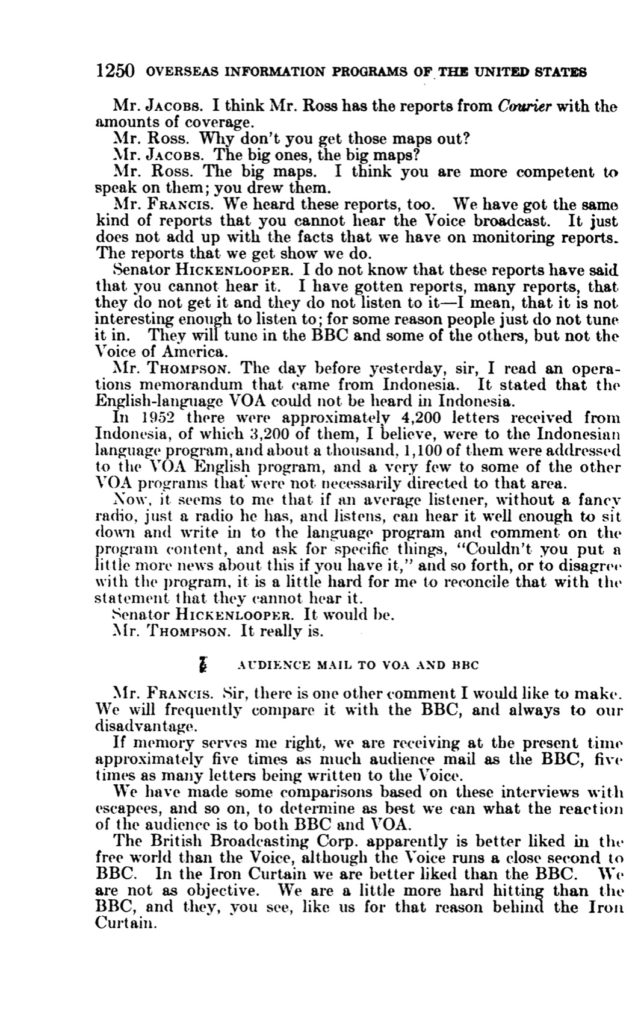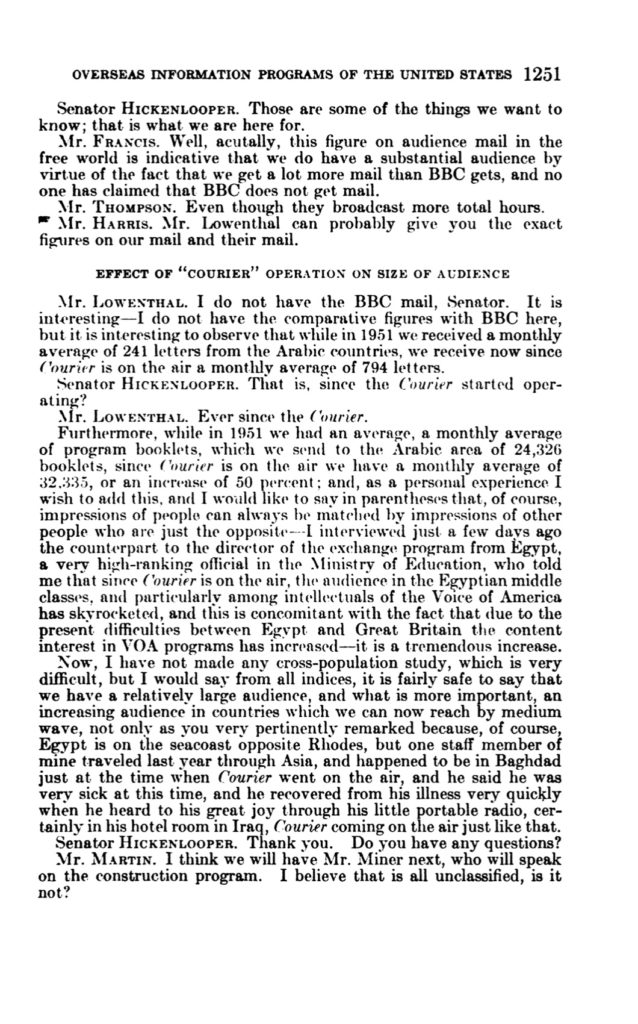USCGC Courier – Voice of America Radio Transmitting Ship – Reception Problems and False VOA Audience Claims PART I
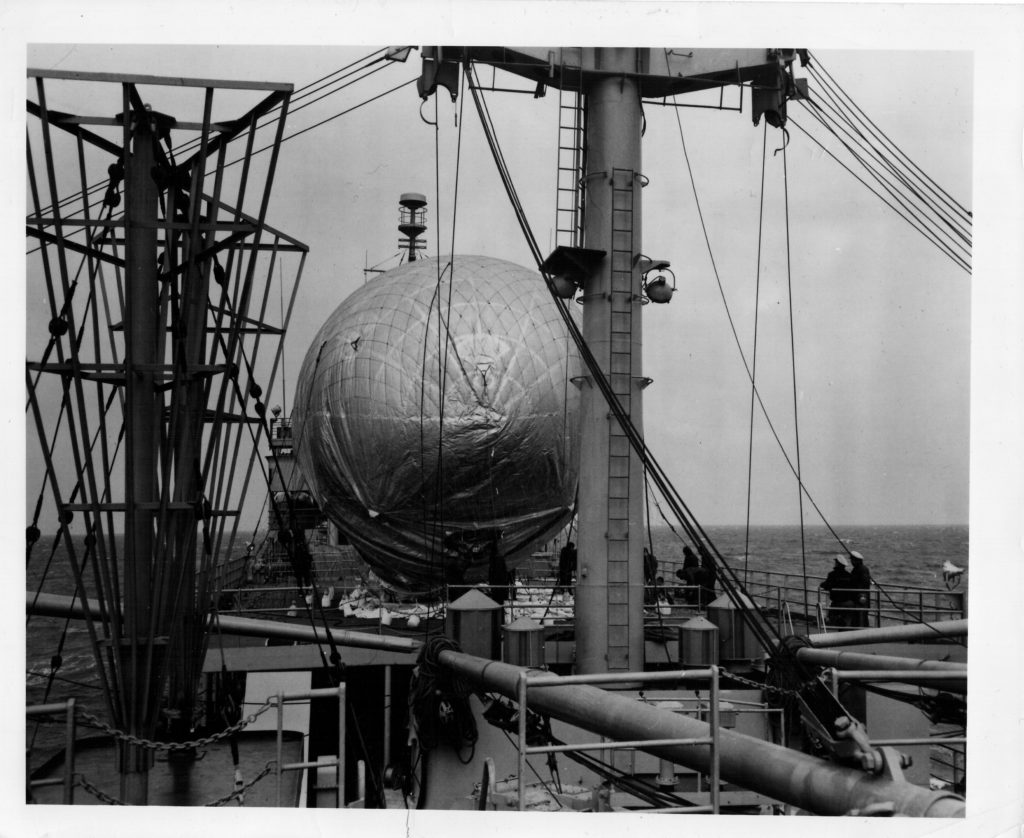
Senator Bourke Hickenlooper
The launching of the Voice of America radio transmitting ship Courier in 1952 was an important part of the “Campaign of Truth,” the international broadcasting and public diplomacy initiative announced by President Harry Truman in a speech two years earlier. The design and the use of the ship by VOA, but mostly the overall management of the State Department’s broadcasting and other informational operations, generated, however, considerable controversy as a result of two separate investigations in the U.S. Senate in 1953. As U.S. lawmakers discovered, VOA management’s audience size claims were misleading and vastly exaggerated for countries with free and partly free media. VOA radio broadcasts had an audience, but not any sizable audience in Western Europe or in the Middle East, especially for VOA English. Even in pre-Castro Cuba, where press freedom was limited, VOA did not have a measurable audience for its Spanish broadcasts.
Speaking on the floor of the House of Representatives on July 24, 1951, Congressman John V. Beamer (R-IN) said that the Voice of America was “about as hard-hitting as a creampuff.”[ref]Ted Lipien, “Voice of America Had No Audience in Pre-Castro Cuba and Initially Supported Soviet Socialism in Eastern Europe,” Cold War Radio Museum (blog), February 24, 2020, http://www.coldwarradiomuseum.com/voice-of-america-had-no-audience-in-pre-castro-cuba-did-poorly-in-exposing-failures-of-soviet-socialism/.[/ref] He revealed that VOA had practically no audience in Cuba, where free media existed before the 1952 coup led by General Fulgencio Batista. There was also some limited press freedom even under the Batista regime. Press freedom in Cuba ended completely with Castro’s communist coup in 1959.
VOA did have an audience in communist-ruled countries behind the Iron Curtain, but Radio Free Europe would soon become the number one Western broadcaster in the region.
There was an element of partisanship associated with the Republicans trying to use the Senate hearings to show that the Truman Administration was soft on the Soviet Union and on communism, which in a larger sense was not true. At the same time, some Voice of America officials and State Department diplomats, as well as some VOA writers and editors, were reluctant to change their attitude toward Russia and some were inexperienced and unsuited to be in charge of a government-funded international broadcasting organization.
Hearings before the Senate Permanent Subcommittee on Investigations chaired by Senator Joseph McCarthy (R-WI) received most of the media attention, but he was not the only U.S. lawmaker to notice weaknesses in Voice of America operations, including the Courier’s technical shortcomings. McCarthy discredited himself and legitimate criticism of management problems at VOA by making false accusations of communist subversion.
Subversives were not a problem because they did not exist after the Truman administration carried out major reforms, but VOA programming was still ineffective behind the Iron Curtain. Some improvements were already being undertaken, but VOA programming to Russia continued to be soft and VOA’s transmitting facilities were still poorly managed. Thanks to whistleblowers, Republicans and even some Democrats started to question VOA officials’ exaggerated claims of success as evidence of the transmitting ship’s design problems were being publicly disclosed by U.S. lawmakers.
The first investigation of Voice of America’s difficulties in implementing the “Campaign of Truth” was initiated by the Senate Foreign Relations Subcommittee on Overseas Information Programs chaired by Senator Bourke B. Hickenlooper (R-IA), a former Iowa Governor, who was particularly skeptical of VOA’s domestic public relations claims.
On April 20, 1953, Senator Hickenlooper questioned Robert J. Francis, Acting Director of International Broadcasting Service (Voice of America) and Program Manager Alfred Puhan about the Courier. Hickenlooper described the Voice of America signal in Cairo, when he listened to it on his overseas trip as “spotty.” He got a Voice of America official to admit that the ship, initially sold to Americans as a solution to Soviet jamming of VOA broadcasts to countries behind the Iron Curtain, was most effective in delivering a medium wave (AM) signal to Arab countries from its stationary and safe location at a Greek island in the Mediterranean. Senator Hickenlooper was not entirely convinced that the Courier performed well even for listeners in the Middle East.
Senator Hickenlooper. Our information on the Courier seems to be very discouraging: You cannot step up the power to satisfactory strength, and it has spotty reception and spotty operation.
Mr. Puhan. Well, there again, I am not too—–
Senator Hickenlooper. It does not reach out very far from the ship.
Mr. Puhan. I believe, Senator, that it is most effective in the Arabic world. Now, there we had a great deal of trouble getting into the Near East before we had Courier stationed there.
I was in Cairo a year ago at that time, and actually I listened to the Voice, and it was an impotent signal. I have seen a great deal of evidence since that time that Courier into the Near East, into Egypt, the Arabic world to the east of it, is very effective.
Senator Hickenlooper. I was in Cairo in December——
Mr. Francis. I beg your pardon?
Senator Hickenlooper. I was in Cairo in December, and I did not have too good a report of it there. They said it depended on where the ship happened to anchor or where it was located. Of course, the closer it was to a country—the closer to shore it was located—the better was the reception.
Mr. Francis. That would be for medium wave; yes.
As to the signal, it is true on one frequency that is also used by Sweden at certain times of the day we have to cut the power down or we would interfere with the Swedish frequency being used. But as soon as they are off the air we tune it up to the full power, 150 kilowatts.[ref]United States. Congress. Senate. Committee on Foreign Relations. Subcommittee Under S. Res. 74 on Overseas Information Programs of the U.S. Overseas Information Programs of the U.S.: Hearings Before the United States Senate Committee On Foreign Relations, Subcommittee Under S. Res. 74 On Overseas Information Programs of the U.S., Eighty-Second Congress, Second Session. Washington: U.S. G.P.O., 1952. Page 831. https://hdl.handle.net/2027/umn.31951d02094637q?urlappend=%3Bseq=851.[/ref]
On May 11, 1953, Senator Hickenlooper questioned Voice of America Acting Director Robert J. Francis, George Jacobs, Acting Chief of Voice of America Central Frequency Staff, Edward T. Martin, Acting Chief Engineer of International Broadcasting Service, and Walter A. Minor, Jr., Acting Chief Construction Division, IRD.
The Senator said that VOA’s “floating relay base…leaves a lot to be desired,” but VOA’s Acting Director Robert J. Francis countered that “reports from countries to which we are broadcasting with Courier indicate very good reception.”
The questions were about reception of Voice of America broadcasts in Egypt. VOA officials were no longer emphasizing the Courier‘s ability to overcome Soviet jamming in Eastern Europe with its medium wave signal.
RECEPTION OF “ COURIER” SIGNAL
Senator Hickenlooper. We have had complaints from 2 or 3 sources about your floating relay base. What is the name of that ship?
Mr. Jacobs. The Courier.
Senator Hickenlooper. It leaves a lot to be desired.
Mr. Miner. In what respect?
Senator Hickenlooper. In the respect that it is just not doing the job. They cannot tune it up to proper strength.
Mr. Miner. I think Mr. Jacobs could give you some facts on that.
Senator Hickenlooper. I do not know; these are reports that we get.
Mr. Martin. I think I can speak on that. The transmitter is a 150-kilowatt transmitter. During the daytime hours we use 150 kilowatts. During the early evening hours, we only run at 40 kilowatts, so we do not cause undue interference to Swedish broadcasting. Whenever the Swedes go off the air we increase it to 150 kilowatts. The limitation in power is purely to prevent undue interference to Swedish broadcasting. With 150 kilowatts we found we were putting so strong a signal in Sweden that we interfered with their local broadcasting.
Mr. Miner. That is down near Rhodes.
Senator Hickenlooper. That is down near the Island of Rhodes.
Mr. Francis. I might say, Senator, reports from countries to which we are broadcasting with Courier indicate very good reception, almost without exception, on medium wave. The Courier reports are the highest reception reports you can have. I have seen the reports from Cairo.
Senator Hickenlooper. The Courier runs up that coast.
Mr. Jacobs. I think Mr. Ross has the reports from Courier with the amounts of coverage.
(…)
Mr. Francis. We heard these reports, too. We have got the same kind of reports that you cannot hear the Voice broadcast. It just does not add up with the facts that we have on monitoring reports The reports that we get show we do.
Senator Hickenlooper. I do not know that these reports have said that you cannot hear it. I have gotten reports, many reports, that they do not get it and they do not listen to it–I mean that it is not interesting enough to listen to; for some reason people just do n to tune it in. They will tune in the BBC and some of the others, but not the Voice of America.[ref]United States. Congress. Senate. Committee on Foreign Relations. Subcommittee Under S. Res. 74 on Overseas Information Programs of the U.S. Overseas Information Programs of the U.S.: Hearings Before the United States Senate Committee On Foreign Relations, Subcommittee Under S. Res. 74 On Overseas Information Programs of the U.S., Eighty-Second Congress, Second Session. Washington: U.S. G.P.O., 1952. Pages 1249-1250. https://hdl.handle.net/2027/umn.31951d02094637q?urlappend=%3Bseq=1273.[/ref]
